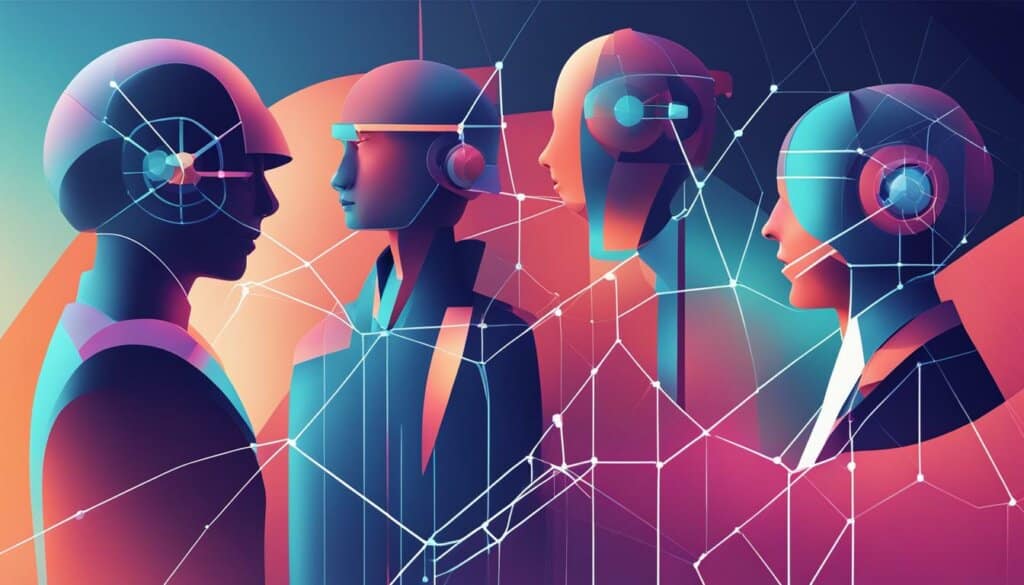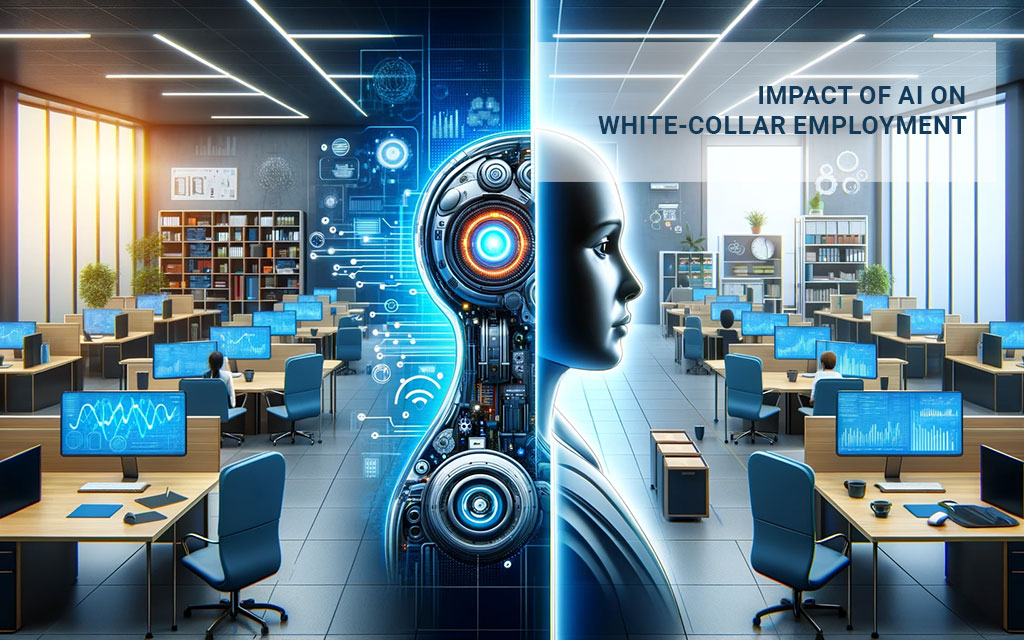Table of Contents
Artificial intelligence (AI) has the potential to revolutionize the way we work, and one of its exciting prospects is the possibility of transitioning to a four-day work week. With AI tools, businesses can reduce working hours while maintaining pay, benefiting both employees and organizations. In this article, we will explore how AI can bring about artificial intelligence benefits, improve work-life balance, and pave the way for a shorter work week.
Studies conducted by thinktank Autonomy suggest that AI could enable millions of workers to move to a shorter working week by 2033. By harnessing the projected productivity gains of AI, the working week could be reduced from 40 to 32 hours, benefiting approximately 8.8 million people, which is around 28% of the UK workforce.
The Role of AI in Workforce Transformation
AI tools are revolutionizing the workplace by offering numerous advantages that enhance productivity. With the automation of routine tasks, such as data entry and email sorting, employees can now dedicate more time to complex and creative tasks. This not only streamlines operations but also boosts overall efficiency and output. By leveraging AI’s capabilities, businesses can optimize their workforce and achieve higher levels of productivity.
“AI offers unprecedented opportunities for businesses to transform their workforce and operations. By automating repetitive tasks, AI tools free up valuable time and resources, allowing employees to focus on more critical and strategic activities. This not only enhances productivity but also improves job satisfaction and work-life balance.”
Moreover, AI’s involvement in customer service through chatbots and virtual assistants has significantly improved customer interactions. These intelligent AI tools provide prompt and accurate responses, ensuring a seamless customer experience. By eliminating repetitive tasks, AI chatbots allow employees to focus on building stronger relationships with customers and addressing more complex issues. This not only enhances customer satisfaction but also improves employee engagement and job fulfillment.
Another remarkable capability of AI is its ability to automate the writing of basic documents and condense extensive reports into succinct summaries. This streamlines the communication process and saves time for workers, allowing them to focus on more value-added activities. AI-powered writing assistants can generate high-quality content that aligns with specific guidelines and requirements, freeing employees from mundane writing tasks and enabling them to focus on strategic and creative aspects.
| AI Tools | Benefits |
|---|---|
| Data Entry Automation | Saves time and reduces human errors |
| Chatbots and Virtual Assistants | Improves customer service and satisfaction |
| Automated Writing Assistants | Enhances productivity and content quality |
Overall, AI tools play a crucial role in transforming the workforce by enhancing productivity and streamlining operations. With their ability to automate routine tasks, improve customer service, and streamline communication, AI tools are revolutionizing the workplace and enabling businesses to achieve new heights of productivity and efficiency.
Impact on Mental Health and Wellness
Working long hours is associated with an increased risk of burnout and mental health problems. Moving to a shorter work week using AI tools may help reduce stress, burnout, and mental health issues among workers. Studies have shown that a four-day work week can lead to significant benefits in mental and physical health, with fewer sick days taken and reduced levels of stress and burnout. This shift could help improve the well-being of employees.
Research conducted by the University of Helsinki found that individuals working 40 hours or more per week had a higher likelihood of experiencing symptoms related to depression and anxiety. By reducing working hours, employees have more time to rest and recharge, leading to better overall mental health. Additionally, a study by the University of Melbourne revealed that a shorter work week is associated with increased life satisfaction and improved work-life balance.
Implementing AI tools can facilitate the transition to a four-day work week by automating repetitive tasks and streamlining workflows. This not only reduces the workload but also creates more time for employees to focus on tasks that require creativity and problem-solving skills. Research has shown that when individuals have more control over their work schedules and can achieve a better work-life balance, they are less likely to experience burnout and are more motivated and engaged in their work.
| Benefits of a Four-Day Work Week | Reduced Working Hours | Stress Reduction | Burnout Prevention |
|---|---|---|---|
| Improved mental health and well-being | More time for personal activities | Decreased levels of stress | Lower risk of burnout |
| Increased job satisfaction | Enhanced work-life balance | Improved sleep quality | Higher employee retention |
| Reduced absenteeism | Greater flexibility in managing personal and family commitments | Increase in overall happiness and life satisfaction | Higher productivity and creativity |
Support for Working Parents
One of the key benefits of implementing AI tools to enable a four-day work week is the support it provides for working parents. The challenges faced by parents in balancing work and family responsibilities, such as lack of flexibility and high childcare costs, can be addressed through this transition. A study conducted by Four-Day Week Global found that employees who participated in a four-day work week reported an increased ability to combine paid work with caregiving responsibilities, leading to a better work-life balance.
By reducing working hours, parents have more time to spend with their children and engage in activities that promote their development. Additionally, the flexibility offered by a shorter work week allows parents to attend school events, doctor’s appointments, and other important engagements without feeling overwhelmed or rushed. This increased flexibility can have a positive impact on the overall well-being of working parents and their families.
Furthermore, the implementation of AI tools can help alleviate the financial burden of childcare costs. With shorter work hours, parents may be able to rely less on external childcare services and spend more time caring for their children themselves. This not only reduces expenses but also strengthens the bond between parents and their children. By leveraging AI technologies to enable a four-day work week, organizations can contribute to the well-being and satisfaction of their employees, particularly those with parenting responsibilities.
Benefits of AI-supported Four-Day Work Week for Working Parents:
- Increased work-life balance
- Greater flexibility in managing family responsibilities
- Reduced reliance on expensive childcare services
- Enhanced quality time spent with children
As organizations consider the implementation of a four-day work week, they must also address the cultural shift and potentially retrain staff to ensure a smooth transition. However, the benefits for working parents, such as improved work-life balance and reduced childcare costs, make it a worthy endeavor that can positively impact the lives of both employees and their families.

The Potential of Chatbots in Increasing Productivity
In today’s fast-paced work environment, businesses are constantly seeking ways to improve productivity and streamline operations. One emerging technology that holds great promise in this regard is AI-backed chatbots. These intelligent virtual assistants have the potential to revolutionize various job roles and enhance productivity in white-collar jobs. With their ability to automate mundane tasks and provide quick and accurate responses, chatbots can free up valuable time for employees, allowing them to focus on more complex and creative aspects of their work.

“Being able to delegate routine tasks to chatbots has been a game-changer for our team,” says Sarah, a marketing executive at a tech company.
Chatbots have significantly reduced the time spent on answering customer queries, leaving us more time to develop innovative marketing strategies and build stronger client relationships.”
This sentiment is echoed by many professionals who have experienced the productivity boost that chatbots bring to their work.
By automating tasks like answering frequently asked questions, providing personalized recommendations, and even assisting with data analysis, chatbots can streamline workflows and improve efficiency across various industries. They are particularly effective in customer service, where they can handle a large volume of inquiries simultaneously, ensuring prompt responses and customer satisfaction. This not only saves time for employees but also enhances the overall customer experience.
Benefits of AI-backed Chatbots:
- Increased efficiency by automating routine tasks
- Improved response time and customer satisfaction
- Enhanced focus on complex and creative work
- Reduced workload and stress for employees
As businesses continue to explore the potential of AI, chatbots are becoming an integral part of their digital transformation strategies. By harnessing the power of AI-backed chatbots, companies can unlock productivity gains, drive innovation, and create a more balanced work environment. With ongoing advancements in AI technology, the future of work is set to be shaped by the seamless integration of chatbots and other AI tools, leading to increased productivity and improved work-life balance.
AI as the Primary Driver for a Four-Day Work Week
The integration of AI in the labor market has brought about significant productivity gains and has the potential to lead the way toward a four-day work week. With the help of AI tools and technologies, businesses can optimize operations, automate routine tasks, and create more engaging customer experiences. These advancements in AI have the potential to reshape the future of work and revolutionize the work-life balance.
The impact of AI on work hours is profound. By leveraging AI capabilities, developers can complete a week’s worth of work in four days or even less. With AI’s ability to automate mundane tasks and provide valuable insights, employees can focus on more strategic and creative aspects of their job roles. This improved efficiency and time savings contribute to increased productivity and job satisfaction.
AI’s influence on work hours extends beyond individual productivity gains. The adoption of AI in various industries can unlock new opportunities and drive further productivity gains across the labor market. As organizations embrace AI projects and solutions, they can streamline workflows, enhance decision-making processes, and create a more efficient and productive working environment.
AI Impact on Work Hours
AI has the potential to revolutionize the future of work by enabling a shorter work week while maintaining or even enhancing productivity levels. Through the use of AI tools and technologies, businesses can optimize operations, automate routine tasks, and create more engaging customer experiences. The integration of AI in the labor market has already shown significant productivity gains and the potential to reshape the work-life balance.
Furthermore, AI’s impact on work hours goes beyond individual productivity gains. By implementing AI solutions, organizations can streamline workflows, automate repetitive tasks, and create more compelling customer experiences. This optimization of work processes can lead to increased efficiency and reduced work hours, ultimately contributing to a better work-life balance for employees.
AI in the Labor Market
The use of AI in the labor market is becoming increasingly prevalent, with more organizations recognizing the benefits of incorporating AI tools and technologies into their operations. AI projects and solutions can help organizations achieve greater efficiency, enhance decision-making processes, and unlock new opportunities for growth.
- AI enables automation of routine tasks, freeing up valuable time for employees to focus on more strategic and creative aspects of their roles.
- AI-powered analytics provide data-driven insights that can inform decision-making and drive informed business strategies.
- AI-driven customer service solutions, such as chatbots and virtual assistants, enhance customer interactions and improve overall satisfaction.
As AI continues to advance and permeate various industries, its impact on the labor market and work hours is expected to grow. The integration of AI tools and technologies represents a significant opportunity for organizations to embrace a four-day work week and create a more balanced and productive work environment.
Summary:
AI’s productivity gains are driving the potential for a shorter work week. The integration of AI in the labor market has already shown significant productivity gains and has the potential to reshape the future of work. AI enables automation of routine tasks, streamlines workflows, and enhances decision-making processes. This optimization of work processes can lead to reduced work hours and improved work-life balance. As organizations continue to embrace AI technologies, the possibility of a four-day work week becomes more attainable, offering increased productivity and well-being for employees.
Optimizing Workflows with AI Solutions
The integration of AI solutions into workflows has the potential to revolutionize productivity and streamline processes. By automating tasks and leveraging advanced algorithms, organizations can unlock significant gains in efficiency and enhance overall performance. AI-powered tools have the capability to analyze vast amounts of data, generate actionable insights, and enable teams to focus on more strategic and complex initiatives.
One example of an AI solution that drives productivity gains is Google Cloud’s Contact Center AI. This technology leverages natural language processing and machine learning algorithms to provide automated customer service support. By utilizing AI chatbots, organizations can handle customer inquiries and requests more efficiently, freeing up valuable time for human agents to address more complex issues. This not only enhances the customer experience but also improves agents’ productivity and satisfaction.
| AI Solution | Key Features | Productivity Gains |
|---|---|---|
| Contact Center AI | – Natural language processing – AI chatbots for automated customer service – Sentiment analysis |
– Reduced call handling time – Increased first-call resolution rate – Enhanced customer satisfaction |
| Translation Hub | – AI-powered translation services – Multilingual support – Real-time translation |
– Streamlined communication across languages – Improved collaboration with global teams – Accelerated international business operations |
| Recommendations AI | – Personalized product recommendations – Machine learning-based recommendations – Dynamic content optimization |
– Increased customer engagement and conversions – Enhanced user experience – Optimized marketing campaigns |
Another AI solution offered by Google Cloud is Translation Hub. This platform provides AI-powered translation services, enabling organizations to communicate effectively across language barriers. With real-time translation capabilities and multilingual support, teams can collaborate seamlessly, accelerating international business operations and fostering global relationships.
Additionally, Recommendations AI is an AI solution that helps organizations deliver personalized product recommendations to customers. By leveraging machine learning algorithms, this technology analyzes user behavior and preferences to generate tailored recommendations. This not only increases engagement and conversions but also optimizes marketing campaigns and enhances the overall user experience.
Conclusion
The incorporation of AI into workflows has the potential to revolutionise work-life balance and drive increased productivity. AI tools can automate routine tasks, improve customer service, reduce stress and burnout, and provide support for working parents. With continued advancements in AI technology, the future of work could be characterised by shorter working hours and improved overall well-being.
The impact of AI on work-life balance cannot be overstated. By automating mundane and repetitive tasks, AI frees up time for employees to focus on more meaningful and creative aspects of their jobs. This not only increases job satisfaction but also leads to a healthier work-life balance.
Furthermore, AI-driven productivity is a key driver for the future of work. By leveraging AI tools and solutions, businesses can optimise workflows, streamline processes, and unlock productivity gains. The ability to complete a week’s worth of work in four days or less is no longer a far-fetched idea, but a realistic possibility with the power of AI.
As we look ahead, it is clear that AI will continue to shape the future of work. By embracing AI technologies and adopting a four-day work week, businesses can create a more sustainable and efficient work environment. The benefits for both employees and organisations are significant, with improved work-life balance, reduced stress, and increased productivity being the cornerstones of this AI-driven future.
FAQ
How can AI help businesses move to a four-day work week?
AI tools can automate routine tasks, allowing employees to focus on more complex and creative work. This increased productivity could enable businesses to reduce working hours while maintaining pay.
What are the benefits of AI in the workplace?
AI tools can save time, boost productivity, improve customer service, and automate the writing of basic documents. They can also condense extensive reports into succinct summaries.
Can a four-day work week improve mental health?
Yes, studies have shown that a shorter work week can lead to reduced stress, burnout, and mental health issues. It can also result in fewer sick days taken and improved overall well-being.
How does AI support working parents?
AI tools can help working parents by providing more flexibility and reducing high childcare costs. This allows them to better balance work and caregiving responsibilities.
What is the potential of chatbots in increasing productivity?
Chatbots powered by AI can automate mundane tasks, freeing up human employees to focus on more interesting and creative aspects of their jobs. This productivity boost can potentially enable a shift to a four-day work week.
How does AI play a role in driving productivity gains?
AI has the potential to significantly increase employee productivity. By 2025, it is projected that AI could allow developers to complete a week’s worth of work in four days or less, leading to shorter working hours.
How can AI solutions optimize workflows?
AI solutions can automate routine tasks, streamline operations, and create more compelling customer experiences. This optimization can lead to productivity gains and improved overall efficiency.
What is the future of work with AI?
With continued advancements in AI technology, the future of work could be characterized by shorter working hours, improved work-life balance, and increased overall well-being for employees.













